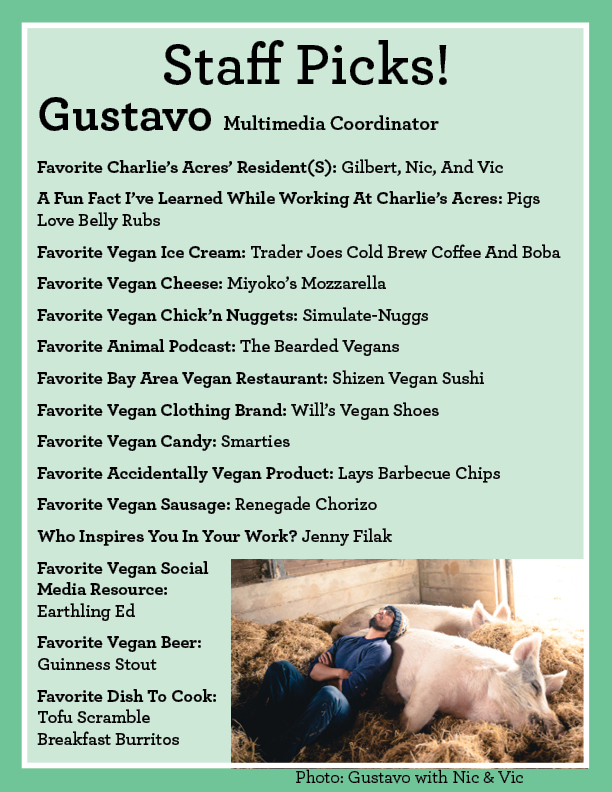HOW YOU CAN EAT KINDER
If you eat animal products like meat, dairy, and eggs, try reducing your intake. Did you know the average American eats nearly 200 animals per year, including sea life? Does eliminating animal products seem like a daunting goal? Try doing it in several steps. The journey to a plant-based diet is not about giving up animal products, it’s about crowding them out. Start by making plants the center of your plate and trying as many new foods as possible. Every time you discover a new vegan food that you love, the animal-based foods you grew up eating get pushed further to the margins.
You won’t miss out on your favorite nostalgic dishes though – just about every dish can be made plant-based. Before long, you’ll find that plant-based eating is delicious and easy!
The following facts and resources will help you get started. They address the reasons for considering a more compassionate lifestyle. They will guide you to change your diet and lifestyle in healthful ways, with recipes for delicious, easy, vibrant meals. They will also help with any challenges you may encounter.
ENVIRONMENTAL IMPACT
In addition to showing compassion for animals, by going plant-based you can have major positive impacts on the health of our planet! Click the icons below to learn more about the impacts that Animal Agriculture has on the environment.


Animal Agriculture & Water
One hamburger requires 660 gallons of water to produce—the equivalent of two months’ worth of showers.
Animal agriculture is responsible for 20 to 33 percent of all fresh water consumption in the world, yet 3 in 10 people worldwide lack access to fresh drinking water.
Animal excrement and agricultural runoff have polluted nearly one-third of rivers in the U.S.


Animal Agriculture & Climate Change
Researchers from Oxford University found that cutting worldwide consumption of animal products in half would cause a 73 % reduction in greenhouse gas emissions.
The UN’s Food and Agriculture committee found that animal agriculture is responsible for more greenhouse gases than the entire global transportation sector and the “lowest impact” beef, such as grass-fed cows, are still responsible for six times more greenhouse gases and 36 times more land usage than raising beans and lentils.


Animal Agriculture & Land Use
Eating animal products is also extremely inefficient. For example, we need to feed a cow 100 calories of grain, just to get 3 calories of beef. If we ate the grain directly, we could take in those nutrients with a fraction of the space needed to raise animals and crops to feed them.
If everyone chose plant-based foods, global farmland could be reduced by 75%, freeing up land mass the size of Australia, China, the EU, and the US combined, while supplying plenty of healthy food to the 9.7 billion people expected to share the planet by 2050.


Animal Agriculture & Environmental Justice
The term climate justice refers to the idea that those who are least responsible for climate change suffer its gravest consequences. Countries producing the least greenhouse gases per-capita are often the most vulnerable to climate change.
Poor rural communities are also impacted by the pollution of animal agriculture. Neighbors of industrial pig farms contaminated wells and horrible stenches due to the millions of tons of waste. Medical literatures documents allergens, gases, bacteria, and viruses released by these facilities – all of them capable of making people sick.
PLANT-BASED HEALTH
Humans can receive all the nutrients we need from a plant-based diet. According to the American Dietetics Association, appropriately planned vegan diets are healthful, nutritionally adequate, and may provide health benefits in the prevention and treatment of certain diseases. Many people still have questions though. Click the icons below to learn more about plant-based nutrient sources.


Where do you get your protein?
Where do you get your protein?
Certainly, one of the most common questions asked about a plant-based diet is “Where do you get your protein from?” The easy answer is: from plants! All plants contain protein. Broccoli contains more protein per calorie than meat from cows! Those on a plant-based diet are far from protein deficient. A study in the Journal of the Academy of Nutrition and Dietetics found that on average, vegetarians and vegans get 70 percent more protein than they need every day! Protein deficiency is almost exclusively seen in people suffering from an overall calorie deficiency.
Many athletes enjoy a plant-based diet including world record-holding strongman Patrik Baboumian, eight-time Olympic Cycling Champion Dotsie Bausch, and professional bodybuilder Nimai Delgado. Check out the 2018 documentary film The Gamechangers to learn more about athletes on a plant-based diet.
The plants containing the highest protein contents include soybeans, edamame, lentils, tofu, red beans, chickpeas, lima beans, peas, quinoa, oats, pumpkin seeds, and peanut butter.


Where do you get your iron?
Iron is another nutrient often brought to attention on a plant-based diet. Iron deficiency anemia could leave you tired and short of breath, as your blood isn’t able to carry enough oxygen. Many breakfast cereals are fortified with iron, but you can also find good plant-based sources of iron in whole meal bread and flour, dark leafy green vegetables such as watercress, broccoli, and spring greens, nuts, lentils, chickpeas, white beans, chia seeds, and dried fruit.
It’s also important to get plenty of Vitamin C in order to increase your absorption of iron. Vegetables high in Vitamin C include broccoli, brussels sprouts, cauliflower, peppers, leafy greens, sweet potatoes, tomatoes, snow peas, and winter squash. Fruits high in Vitamin C include guavas, kiwi, strawberries, oranges, and papaya, among others.


Where do you get your calcium?
Both Calcium and Vitamin D work together for strong and healthy bones. Many plant-based products are fortified with calcium such as soy, rice, and oat milks, and some bread flours. You can also find calcium in green leafy vegetables such as broccoli, cabbage, okra, kale and collard greens, in sesame seeds and tahini, and in dried fruit such as raisins, prunes, figs, and apricots.
Vitamin D helps regulate the amount of calcium in your body. You can absorb Vitamin D through the sun on your skin, or through fortified foods or vitamin supplements.


What's the deal with Vitamin B-12?
It’s important for everyone to have reliable sources of Vitamin B-12 in their diet. B-12 is important for red blood cell formation, neurological function, and DNA synthesis. B-12 deficiency is not just a concern for vegans though. Researchers found that nearly 40% of people in the US are deficient in B-12.
B-12 is produced by the bacteria of the digestive tract and by microbial fermentation of foods. It used to be found in the soil, and available on un-washed vegetables, however, our soil is so depleted, the nutrient levels are no longer sufficient. Modern farmed animals often receive B-12 supplements in their feed, which is why humans are capable of getting B-12 from eating animals.
Many plant based foods such as meat analogues, plant-milks, and nutritional yeast are fortified with Vitamin B-12. Whether you’re a vegan or not, taking a B-12 supplement is a good idea to be on the safe side.
OUR FAVORITES
Who better to guide you on your plant-based journey than the dedicated team at Charlie’s Acres Farm Animal Sanctuary? Our staff, passionate about animal advocacy and delicious food, is excited to share their favorite plant-based products with you. From go-to snacks to essential pantry staples, these recommendations are tried and true and guaranteed to make your plant-based lifestyle delicious and satisfying.
The plant-based food market is exploding with fantastic new products. Here are some brands we LOVE.
Having trouble finding these brands at your local grocery store? Check out GTFO It's Vegan, the online vegan supermarket!
PLANT-BASED EATS NEAR THE SANCTUARY
So you’ve just finished your tour at Charlie’s Acres and you want to continue doing good things for animals by enjoying a plant-based meal. Where can you go next? Check out the map below for great vegan-friendly options in our community!
Headed back on the road? Fast food chains such as Taco Bell, Carls Jr., Burger King, Del Taco, and Chipotle offer easy vegan options!
FURTHER RESOURCES
.
Ready to do something great for animals, the environment, and your health? Check out these resources to get started:
– Get started with recipes and advice with Vegan Outreach’s free 10 Weeks to Vegan Program from a variety of countries or check out the book Veganize It! Easy DIY Recipes for a Plant-Based Kitchen by Robin Robertson.
– Learn more about animal agriculture’s impact on the environment with the documentary Cowspiracy, reading We are the Weather by Jonathan Saffrom Foer, or listening to the Eat for the Planet podcast.
– Find out what positive health impacts plant-based eating can have on your body by watching The Game Changers documentary, Forks Over Knives, or by reading The Way of the Vegan Meathead by Daniel Austin.
– Learn more about the lives of farmed animals and why they need help by reading The Inner World of Farm Animals by Amy Hatkoff, Why We Love Dogs, Eat Pigs, and Wear Cows by Melanie Joy or watching Dominion (this documentary contains graphic imagery).
– Get deeper into a variety of issues surrounding animal agriculture by watching Food, Inc., listening to The Disclosure podcast, or checking out the Food Empowerment Project website.
– Find positivity and community by listening to The Chickpeeps podcast, Our Hen House podcast, or reading The Joyful Vegan by Colleen Patrick-Goudreau.





